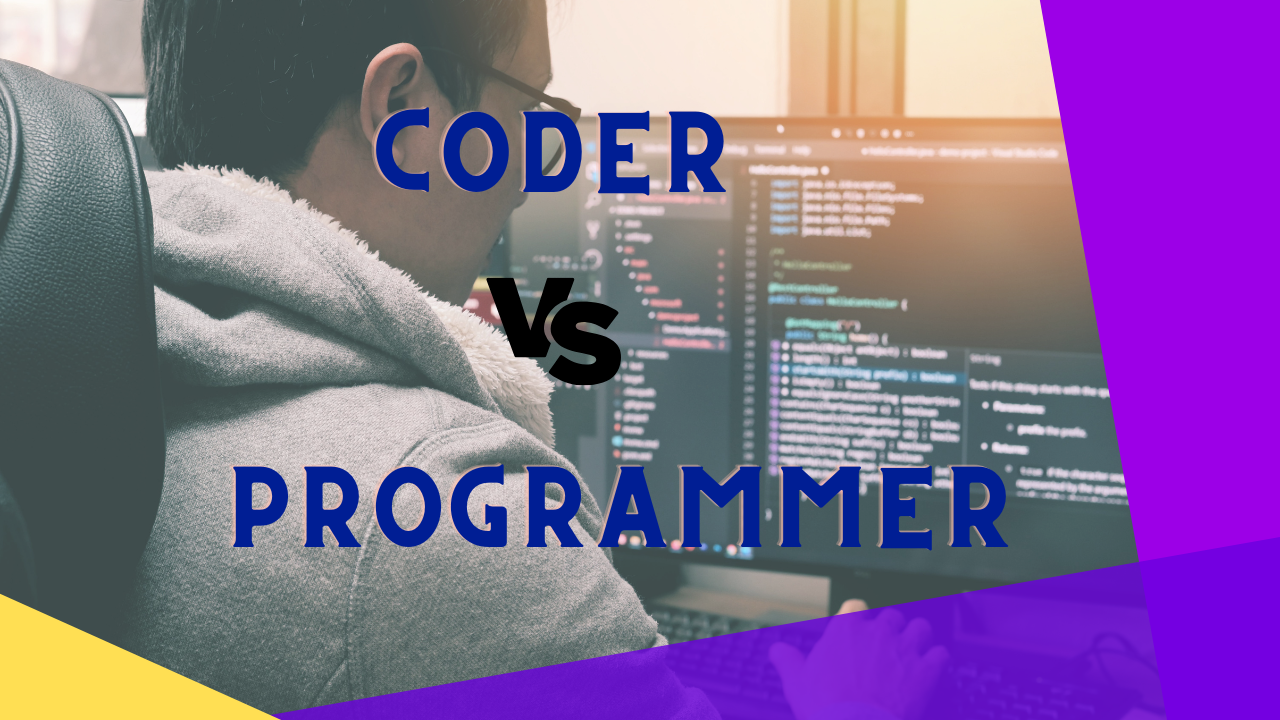Coder vs. Programmer: Understanding the differences

Coders and programmers play a crucial role in businesses across various industries, contributing significantly to their success, innovation, and growth.
Their expertise in software development and coding languages empowers thriving businesses. Companies are given the capability to create, maintain, and optimize digital solutions that drive efficiency, competitiveness, and customer satisfaction.
This article will explain the distinct roles of a Coder vs. Programmer and help you decide which job function best suits your business requirements.
Coder vs. Programmer: An overview
“Coders” and “programmers” might seem synonymous, but they have distinct responsibilities. Recognizing these differences can aid companies during the hiring process.
What is a coder?
A coder is a software developer who crafts applications. Coders turn design and requirements into functioning software using coding.
They use languages like:
- Javascript
- Python
- Go
- Java
- Kotlin
- PHP
- C#
- Swift
Responsibilities of a coder
Cobers’ functions can change based on what they do and the project they’re working on.
Here’s what coders usually do:
- Writing code: Coders create software, websites, or digital stuff. They change design ideas into real code using Python, Java, and C++.
- Problem solver: Coders solve tricky problems. They figure out smart ways to solve things using code tricks and steps. This needs good thinking skills.
- Collaboration: They join teams with designers, project managers, etc. Talking and working together makes sure the code matches the big project plans.
- Testing and debugging: Coders often test their code for mistakes and problems. They fix these, so the software works well and users like it.
- Optimization: Good code is fast. Coders ensure their code runs quickly and doesn’t use too much memory. This helps make the software fast and smooth.
- Writing notes: Coders write notes about their code. These notes say what the code does and how it works. This helps other people understand the code.
- Documentation: Tech changes quickly. Coders learn new things to stay good at their job. They keep up with new languages and tools.
- Security: Using innovative strategies, coders ensure software security by implementing effective measures to prevent malicious activities, such as hackers stealing information.
- Keeping track: Coders utilize tools to monitor code changes, enabling collaborative work and maintaining multiple software versions.
- Continuous learning: Coders are perpetual learners, constantly improving by acquiring fresh knowledge, whether it’s about innovative coding techniques or emerging technologies.
- Doing it right: Coders adhere to coding rules to maintain code clarity, ensuring that fellow coders can easily comprehend and work with it.
- Sharing smart solutions: When coders solve challenging problems, they share their solutions with others, benefiting their team and fellow coders encountering similar issues.
Coder’s educational background
Becoming a coder has different paths. Some coding roles need formal education, while others value practical skills.
A degree in computer science, software engineering, or related fields can help with a coding career.
But not all coding jobs require a formal degree; many successful coders learn independently or through bootcamps and practical experience.
What truly counts is their skill in writing great code and solving problems effectively.

What is a programmer?
A programmer writes code and designs software architecture. They create the structure and logic behind programs.
Programmers employ problem-solving skills and programming techniques to construct intricate algorithms and codebases.
Responsibilities of a programmer
A programmer’s job includes a lot of different tasks related to making software. Programmers’ responsibilities can change depending on their job, project, and workplace.
But here are some things they usually do:
- Writing code: They write, test, and fix code to make the software work how it should.
- Problem solving: They identify and rectify code issues and develop problem-solving strategies during the software development process.
- Making algorithms: They plan how the software should work efficiently. It’s like designing a recipe for the computer.
- Collaborating: They work with other teams, like designers and testers, to finish projects and ensure they work well.
- Designing: They make plans for how the software should be built. They decide how different parts of the software will work together.
- Keeping track of changes: They use tools to keep track of changes they make to the code. This helps them work together and remember what they did.
- Testing: They create and employ tests to verify the proper functioning of the software, similar to how car components are tested before the vehicle is driven on the road.
- Writing instructions: They make documents that tell others how to use the software and how the code works. It’s like writing a manual for a new gadget.
- Learning new stuff: They always learn about new things in the field of software. It’s a fast-changing area.
- Optimizing software: They find and fix things that make the software slow. They want it to work as fast as possible.
- Security: They ensure the software is secure and nobody can break in or steal information.
- Maintenance and update: They keep the software in good shape. They fix problems that come up and add new things to it.
- Code review: They review each other’s code to ensure it’s good and works well. It’s like having someone check your homework.
- Troubleshooting: They look into problems that users report and fix them.
- Deployment: They put the software where people can use it. It’s like setting up a store for people to shop in.
- Performance monitoring: They ensure seamless compatibility between various software versions.
- User experience: They guarantee user-friendly and effective software for people to use.
- Being ethical: They make ethical decisions, such as safeguarding personal information and considering the social impact of the software.
Programmer’s educational background
Usually, a programmer needs a bachelor’s degree in computer science, computer engineering, or a closely related field.
Computer science courses cover coding, software development, databases, algorithms, data structures, and computer architecture.
Yet, degrees in subjects like physics, mathematics, or information technology can also give a strong base for a programming career.
Programmers must build a solid understanding of mathematics and logic to create efficient, effective, dependable systems.
Understanding probability and statistics is also beneficial, especially when programmers work on intricate software systems dealing with real-world data.
Bootcamps have also emerged as a popular and quicker alternative to learning to code skills where you do not have a computer science or related degree.
What matters most is their ability to design and implement complex software solutions.

Coder vs. Programmer: What skills to look for
Coders and programmers are both essential roles in software development. However, they often possess distinct skill sets that contribute to different aspects of the development process.
While there can be some overlap, their responsibilities and areas of expertise can vary.
Skills to look for in a coder
Several key attributes must be considered when evaluating coders, whether for hiring or assessing their skills.
Here are some essential skills to look for in a coder:
- Skill in programming languages: A coder should be well-versed in one or more programming languages, depending on the needs of your business.
- Problem-solving abilities: Coders must analyze complex problems and find creative solutions through coding.
- Attention to detail: Writing code requires precision, and coders must have a keen eye for detail to catch and fix errors.
- Collaboration skills: Coders often work as part of a team, so strong collaboration skills are vital for seamless project execution.
Skills to look for in a programmer
When evaluating programmers, consider the balance between technical skills and soft skills.
Here are essential skills to look for when hiring a programmer:
- Strong programming skills: Programmers should understand multiple programming languages and paradigms. It enables them to design and start complex software solutions.
- Analytical thinking: Programmers need strong analytical skills to break down complex problems and develop effective algorithms.
- Project management abilities: As programmers are involved in the overall design and development process, they must have good project management skills to ensure timely and efficient delivery.
- Communication skills: Programmers often collaborate with cross-functional teams, so effective communication is crucial for successful project execution.
Coder vs. Programmer: Which role suits your business needs?
Overall, programmers and coders share similar responsibilities, including:
- Writing code
- Understanding project requirements
- Problem-solving
- Testing and debugging
- Collaboration
- Continuous learning
- Documentation
- Maintaining codebase
- Adhering to standards and guidelines
- Troubleshooting.
When deciding between a coder and a programmer for your business, consider the complexity of your software projects and the specific skills needed.
You can opt to screen your applicants on your own for in-house talents or tap providers such as Sourcefit for quality offshore staffing.
Choose a coder if you have simple tasks or need someone mainly to write good code. On the other hand, hire a programmer if you have complex projects that need planning and building from scratch.
Choose based on your business’s requirements and understand the differences between coders and programmers.







 Independent
Independent




